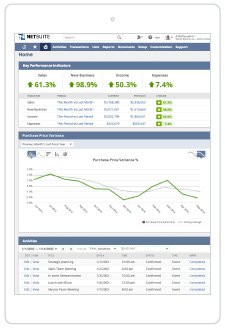CEO
Manage business challenges such as productivity, scalability and costs and with a trusted partner
Lead Your Company Forward
Open up New Markets, Serve Customers, Increase Efficiency, Control Costs and Develop New Products, Markets and Services
A business owner/CEO is ultimately responsible for every decision that is made within the company. The job can be very demanding, but also very rewarding when the company succeeds. You may have a clear vision of where your company needs to be but not a clear path on how to get there.
NetSuite is the #1 choice for mid-size businesses to run their accounting/ERP, CRM and ecommerce applications in the cloud. NetSuite helps you run your business rather than managing technology.
With NetSuite, your business can benefit from lower overall costs, better alignment between technology and specific business needs, scalability, ease of deployment and management, easier upgrades, anytime anywhere access and high reliability.

Benefits
CEO the Leader
Focus on revenue and company growth, reduce costs, re-evaluate and reinvest in workforce, focus on customers and improve profitability.
CEO the Strategist
Increase business value through financials, product quality and company reputation, and execute on expansion strategy while maintaining an efficient and cost-effective organization.
CEO the Steward
Delegate productive tasks and focus on providing employees with everything they need to excel in their jobs.
CEO the Catalyst
Develop a truly collaborative work environment. Enable employees and departments to share information, leverage each other’s strengths and tap available resources in the most efficient manner.
Features
Scale to Support Growth
Use technology to scale and increase efficiency, open new markets, serve customers, increase efficiency and for new product and service development.
Reduce Costs
Significantly lower the costs of infrastructure, professional services, and ongoing support requirements to install, configure, deploy and maintain an ERP system.
Drive Business Decisions
Built-in, real-time financial dashboards, reporting and analytics providing a complete summary and detailed views of finance, sales and service performance.
One Cloud Solution for Your Entire Business
NetSuite delivers accounting/Enterprise Resource Planning (ERP), Customer Relationship Management (CRM), Professional Services Automation (PSA) and ecommerce—in a single, integrated business management software solution.
Disaster Recovery and Business Continuity
Because NetSuite uses multiple redundant sites, it provides business continuity and disaster recovery.
Anytime Anywhere Access
Access financial and customer data from anywhere, 24 hours a day.
































